100% placement in the first CSE batch of SRM University-AP with the highest offered salary of 50 LPA
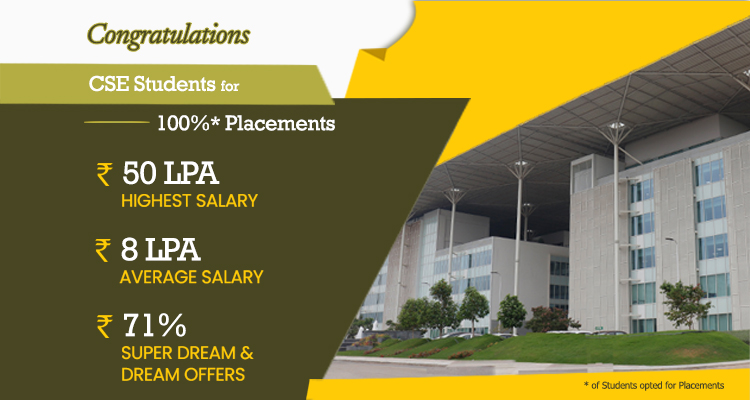 While the maiden batch of the nascent SRM University-AP is ready to set foot for the next venture, the Department of Computer Science and Engineering (CSE) proudly announces 100% successful placement for its students. The first-ever placement drive in SRM University-AP began last year amid the COVID-19 pandemic. However, overcoming all the difficulties, the talented engineers of the CSE department found their passion and a job offer according to their will. The brilliant students of CSE bagged envious offers with the highest salary of 50 LPA and an average salary of 8 LPA. 71% of the students are placed with Super Dream and Dream offers, which is highly commendable.
While the maiden batch of the nascent SRM University-AP is ready to set foot for the next venture, the Department of Computer Science and Engineering (CSE) proudly announces 100% successful placement for its students. The first-ever placement drive in SRM University-AP began last year amid the COVID-19 pandemic. However, overcoming all the difficulties, the talented engineers of the CSE department found their passion and a job offer according to their will. The brilliant students of CSE bagged envious offers with the highest salary of 50 LPA and an average salary of 8 LPA. 71% of the students are placed with Super Dream and Dream offers, which is highly commendable.
Amid the unprecedented crisis, the hiring process was a difficult task to be performed for both the students and the recruiters. Corporate Relations and Career Services (CR&CS), the placement team of the university, has done an excellent job by conducting the placement drive with passion and dedication. The students were provided with every support they needed during these trying times. During their internships and projects in reputed companies, the students had hands-on experience, industry exposure, and became aware of the expectations of the corporate world. This experience helped the students to prepare for the job interviews. The numerous training sessions arranged by the CR&CS team for core and soft skill development brushed up their knowledge and personality. The mock interviews, sessions with corporate experts also assisted the students in their preparation. The interdisciplinary modernised curriculum provided the students with in-depth knowledge in their domain, strengthening their basic skills.
“Every moment at SRM-AP was so defining. Academics and research, 24×7 student-run Next Tech Lab, Semester Abroad and Entrepreneurship at UC Berkeley, USA and winning Hackathon in Bay area competing with MIT, Stanford and Carnegie Mellon gave us the wide exposure of the real world, which would not have been possible without the continuous support of our faculty and university management. Now, it is time that we start our life in Japan, and we are very much looking forward to the new chapter,” said Rajarshi Mazumder, who has received the highest offer of this season with a pay package of 50 LPA along with his twin Saptarshi. Sri Ritika Katragadda, who has been offered one of the best packages with 29.5 LPA, opined, “The selection process was tough, but with the extensive knowledge we gained in the classroom studies, I cleared it with ease.”
“The support I received from my professors and CR&CS team is unforgettable. I am forever grateful to their guidance, for being able to secure such a good offer,” said Sai Krishna Rohith, who bagged an offer of 20 LPA. “Prof Ragunathan is like a father figure to me. I can reach him anytime without any hesitation, even in case of a smallest doubt. All other faculty members were equally supportive,” asserted Venkata Sai Nikhith Nagamlla. Venkata also received an offer of 29.5 LPA.
Mr Vivekanandan, Assistant Director, Corporate Relations and Career Services, said, “We always looked for the best opportunities for our students. The talent exhibited by the CSE students during the internships, projects, curriculum and extra-curriculum activities naturally drew the best recruiters to SRM University-AP.”
“SRM University-AP has made its name as a reputed tech hub to the recruiters who are searching for the best engineers to recruit. We are certain that in the coming years, the numbers of top offers will further increase, creating a record in the country,” shared Professor Ragunathan, Associate Dean in the School of Engineering and Basic Sciences and Head of the Department of Computer Science and Engineering.
“SRM University-AP is founded with the vision to offer quality engineers, entrepreneurs and professionals to the country. In the First Placement Drive itself, the university has proved its mettle and has become a favourable destination for top recruiters,” said Prof V S Rao, Vice-Chancellor, SRM University-AP.
- Published in CR&CS NEWS, CSE NEWS, News, Students Achievements
3rd Year EEE Student Selected for Prestigious “INAE – Engineering Student Mentoring Programme”
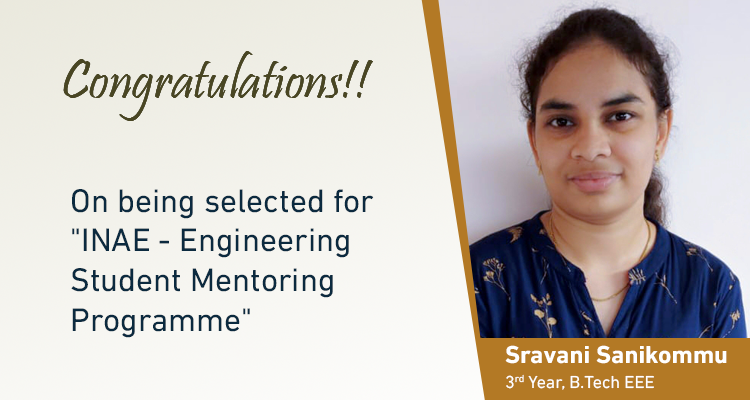 Ms Sravani Sanikommu, a vibrant and keen third-year Electrical and Electronics Engineering (EEE) student from SRM University-AP, has been selected for the prestigious Mentoring of Engineering Students by INAE Fellows Programme by the Governing Council of Indian National Academy of Engineering (INAE). She is one amongst 59 brilliant students who have been selected from across the country this year. The objective of this distinguished programme is to mentor outstanding B.E/BTech undergraduates by INAE fellows. Meritorious 3rd /4th year B.E./B. Tech students from recognised Engineering institutions are eligible under the scheme. Candidates must have a minimum of 75% or a CGPA of 7.5 to be considered for this programme. The mentorship program takes place through an online medium.
Ms Sravani Sanikommu, a vibrant and keen third-year Electrical and Electronics Engineering (EEE) student from SRM University-AP, has been selected for the prestigious Mentoring of Engineering Students by INAE Fellows Programme by the Governing Council of Indian National Academy of Engineering (INAE). She is one amongst 59 brilliant students who have been selected from across the country this year. The objective of this distinguished programme is to mentor outstanding B.E/BTech undergraduates by INAE fellows. Meritorious 3rd /4th year B.E./B. Tech students from recognised Engineering institutions are eligible under the scheme. Candidates must have a minimum of 75% or a CGPA of 7.5 to be considered for this programme. The mentorship program takes place through an online medium.
The Governing Council of the Indian National Academy of Engineers (INAE) designed the mentoring programme to encourage future engineers in the nation to make significant contributions to engineering and technology for holistic solutions. Due to COVID-19 pandemic, online internship is also available. Ms Sravani gets an opportunity to work online in the host institution in the field of power electronics under the able mentorship of INAE Fellow Prof B G Fernandes, Electrical Engineering, Indian Institute of Technology Bombay (https://www.ee.iitb.ac.in/wiki/faculty/bgf) for 2 Months. She extended her gratitude to Dr Tousif Khan N, the Head of the Department, and Prof Sastry V Vedula, a distinguished visiting professor in the Department of Electrical and Electronics Engineering, as well as an INAE fellow, for initiating her into the mentoring programme and providing constant guidance.
Sravani stated that she had complete supervision of faculty members of SRM-AP during the preparation for this two month Mentoring Programme. The extensive research expertise of faculty members aided significantly throughout the selection process among the finest applicants. “I thank everybody who has put efforts into making this happen. SRMAP can provide such amazing opportunities to research in the fields in which students are interested in working. This is made possible through the faculty members who are experienced in the specified fields which helps the students to learn more about the subject and form a substantial idea on how the concepts work. If somebody is keenly interested in research on something they love and are very passionate about it, SRMAP is the right place!!”, said Ms Sravani with overwhelming enthusiasm.
- Published in EEE NEWS, News, Students Achievements
Renowned physicists deliver talks at the “One-Day National Symposium on High Energy Physics.”
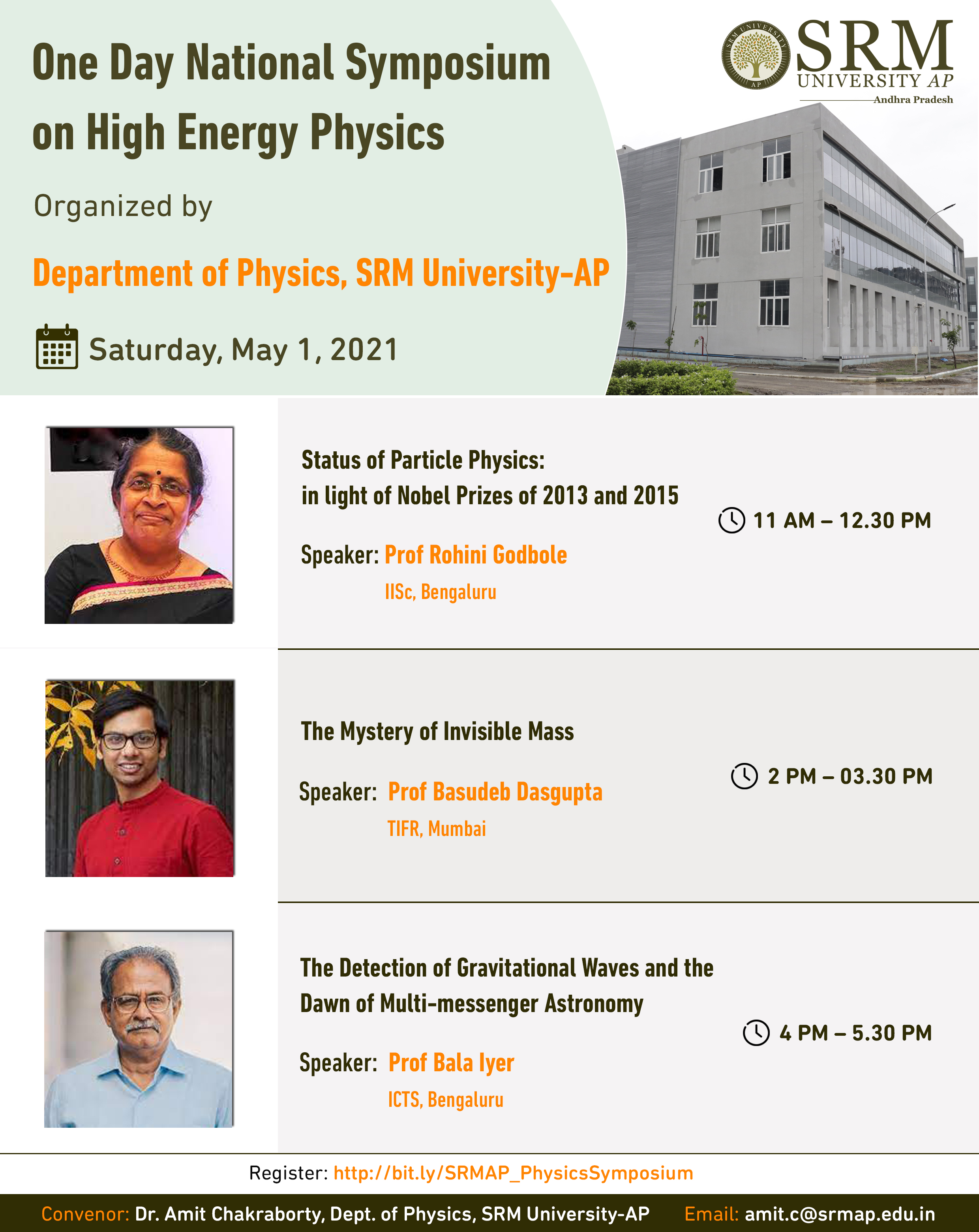 The Department of Physics, SRM University-AP organized a “One-day National Symposium on High Energy Physics” on Saturday, May 1, 2021. The session was held through online mode in the presence of honourable leaders of the university, faculty members, and attendees from various fields of interest. Prof V S Rao, the Vice-Chancellor, SRM University-AP, welcomed the gathering with a brief overview of the university’s inception and quick progress in the field of research.
The Department of Physics, SRM University-AP organized a “One-day National Symposium on High Energy Physics” on Saturday, May 1, 2021. The session was held through online mode in the presence of honourable leaders of the university, faculty members, and attendees from various fields of interest. Prof V S Rao, the Vice-Chancellor, SRM University-AP, welcomed the gathering with a brief overview of the university’s inception and quick progress in the field of research.
Three talks at the pedagogical level were organised for a wider audience, especially for the students of basic sciences and engineering streams. The first speaker, a Padma Shri awardee, Prof Rohini Godbole, who is a theoretical particle physicist at Indian Institute of Science (IISc), Bengaluru expounded on “Status of Particle Physics: in light of Nobel Prizes of 2013 and 2015”. She talked about the Higgs Boson’s theoretical postulate, for which the Nobel Prize in Physics was granted in 2013. According to studies, it was the final missing element in the Standard Model’s periodic table (SM). Her paper incorporated the experimental finding of the Neutrino Oscillation, as well as many compelling pieces of evidence that led to the 2015 Nobel Prize.
In the afternoon session, the talks were on the burgeoning field of Dark Matter physics and Gravitational-wave astronomy. Prof Basudeb Dasgupta from Tata Institute of Fundamental Research (TIFR), Mumbai apprised the participants on “The Mystery of Invisible Mass”. The deep understanding and expertise of Prof Dasgupta in the interfaces of particle physics, astrophysics, and cosmology with a particular emphasis on dark matter and neutrino physics as a theoretical physicist at the Tata Institue of Fundamental Research (TIFR) enlightened the audience. He stated that the human beings are able to see only 20% of the universe’s celestial objects; the remaining 80% are unseen and are referred to as “dark matter.” In his words, “Billions of years after the Big Bang, all we can see is the cloud’s surface, where the light is scattered.” Prof Basudeb, is a frequent speaker at prestigious international and national conferences and is a youth icon for aspiring physicists and scientists.
The final lecture of the day was delivered by Prof Bala Iyer from International Centre for Theoretical Sciences (ICTS), Bengaluru on “The Detection of Gravitational Waves and the Dawn of Multi-messenger Astronomy” at 4.00 pm. Prof Iyer is currently the Simons Visiting Professor at ICTS-TIFR Bangalore and co-PI of the LIGO-India Scientific Collaboration. He coaches and guides young minds interested in astrophysics, cosmology, and fundamental physics. Prof Iyer did a presentation on the discovery of gravitational waves from a binary black hole in 2015, which was a watershed moment and necessitated the launch of a new multi-messenger astronomy with the potential to have a significant impact on astrophysics. “Any relativistic theory of gravity must be consistent with the special relativity principle. Gravity’s effect cannot travel faster than the speed of light. If an item’s gravitational field changes, the changes propagate over space and take a certain amount of time to reach the object “, he added.
The symposium that aimed to discuss the current status of exciting research topics of High Energy Physics concluded with a Q&A session. This has proved that the faculty members and participants were highly inspired and motivated after attending the symposium and listening to the scholars.
Pre-Event Release: https://srmap.edu.in/events/national-symposium-on-high-energy-physics-2021/
- Published in News, Physics News
“Films as History; Exploring Historiophoty”, the First of Illuminating Webinar Series
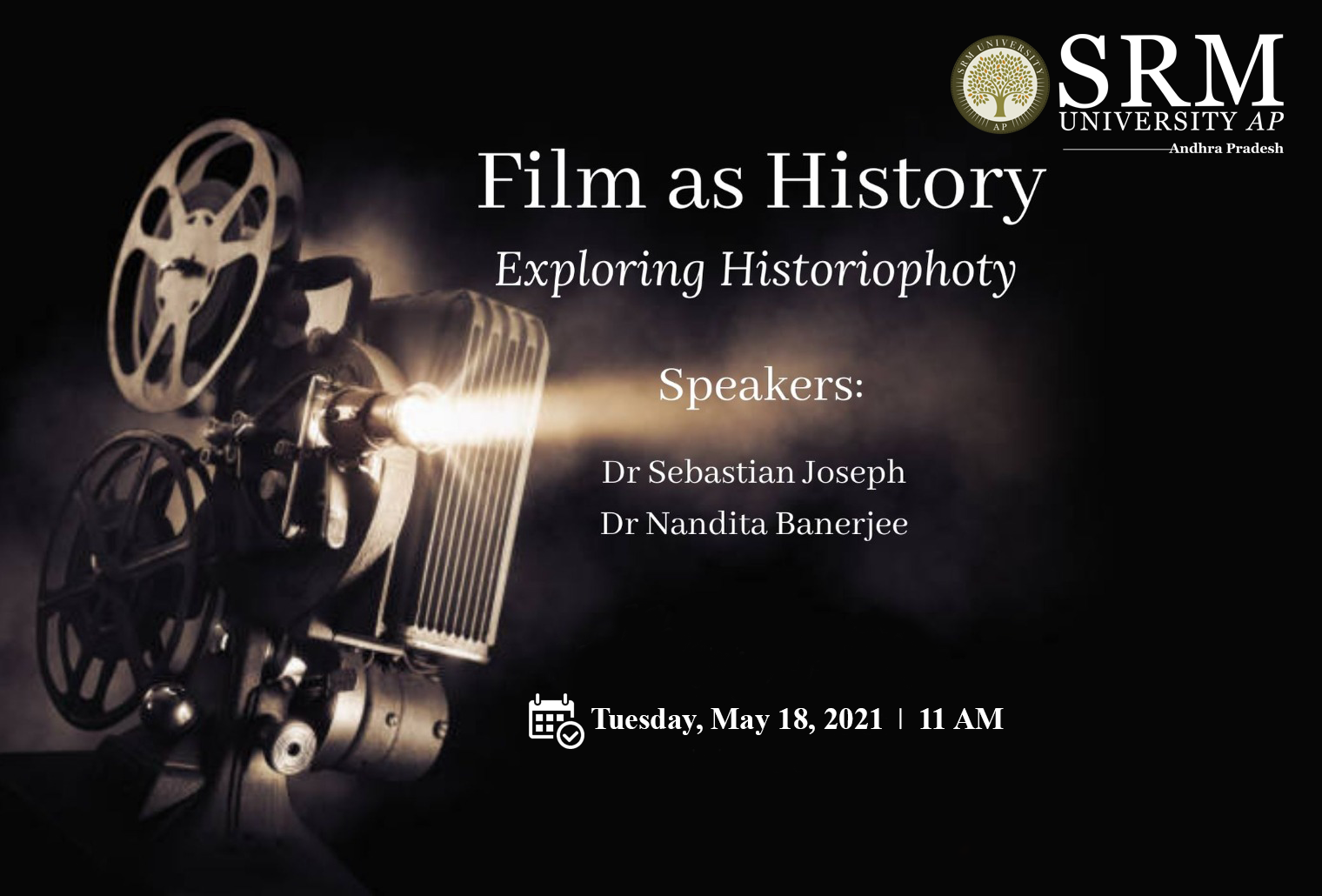 A webinar aimed to discuss the use of films in particular and visual images in general as sources for the reconstruction of History was organized by the Department of History on May 18, 2021. Films as History; Exploring Historiophoty, the first of the monthly Webinar series on new and exploratory themes in History, dealt with the promises and challenges of Historiophoty as a sub-stream of history. Following Hayden White’s pathbreaking analysis of visual imagery and its location in historiography, historiophoty has emerged as a most promising pathway for historians particularly as we move towards a rapidly digitizing world.
A webinar aimed to discuss the use of films in particular and visual images in general as sources for the reconstruction of History was organized by the Department of History on May 18, 2021. Films as History; Exploring Historiophoty, the first of the monthly Webinar series on new and exploratory themes in History, dealt with the promises and challenges of Historiophoty as a sub-stream of history. Following Hayden White’s pathbreaking analysis of visual imagery and its location in historiography, historiophoty has emerged as a most promising pathway for historians particularly as we move towards a rapidly digitizing world.
Dr Sebastian Joseph, a Historian and Film Critic and recipient of the State Award for Best work on Film History 2020, and the author of Cochin Forests and British Techno-ecological Imperialism in India addressed the first part of the webinar. He compared the textual and cinematic representations of history through the lens of the Historian Robert Rosenstone, who divided the plot of a film into three parts: beginning, middle, and end. Dr Joseph conveyed his knowledge of history and cinema through six distinct characteristics put forth by Rosenstone.
(i) A distinction was made between textual and cinematic representations of history, with the latter presenting problematic and conceptual history in a narrative format for better comprehension. (ii) Cinematic representations of history resemble personal narratives more than historical narratives. The straightforward narrative representation aims to communicate and establish an immediate connection with the audiences behind the cinema screens. (iii) The storyline narrated in historical cinematic representations must have a satisfactory conclusion. Historical representations of films dramatize, personalize, and emotionalize, whereas textual history critiques the emotional aspects, as they can invalidate the credibility of the sources. (iv) Film adds to the overall emotional experience of viewers by using music, sound effects, dialogue, and so on. Dr Joseph deduced from Rosenstone’s fifth and sixth characteristics that the historical depictions in cinema are fictional and reflect the socioeconomic and political conditions of society. At the end of the session, he postulated that “there is a tale behind every story, and there is no way that we can look at films as secondary sources of history, but as the primary source for history and historical explanations.”
Dr Nandita Banerjee, Associate Professor at Sidho-Kanho-Birsha University, West Bengal delivered the keynote address during the second half of the webinar. Dr Banerjee provided a critical analysis of the evolution of traditional art and visual images into digitised form. Historians observed the live depiction of civil wars, conflicts, and protests through the documentation captured on camera footage. Visual evidence such as photographs and records are authentic sources and history would be incomplete without them. She further added that “Learning from history is never a one-way street, and learning about the present in light of the past entails learning about the past in light of the present. History is the in-depth study of the past and present. Images, according to some world historians, are the established method of remembering the past. Since the dawn of human evolution, the visual image has served as a representation of social memories in art. ” She validated her perspective by citing the German war and the Vietnamese conflict, both of which are visible in world history because of visual and oral footage. Dr Banerjee also discussed the enormous influence visual images on audiences and the place it marks in the worlds of film and history.
The webinar came to an apprising close with a panel discussion followed by a Q&A session.
Pre-Event Release: https://srmap.edu.in/events/films-as-history-exploring-historiophoty/
- Published in Departmental News, History Current Happenings, History News, News
ICMR-NIN Scientist on the Dietary Risk Factors for NCDs
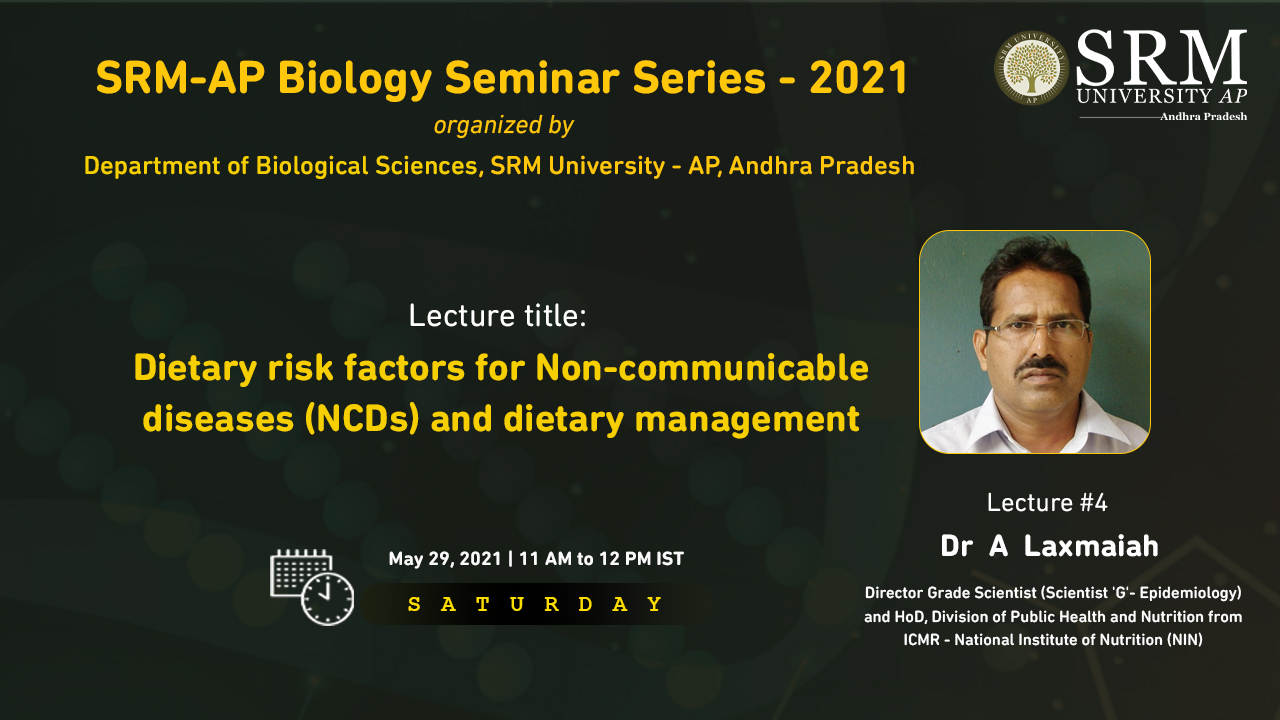 A profound and astute fourth edition of the Biology Seminar Series on the theme “Dietary Risk Factors for Non-communicable Diseases (NCDs) and Dietary Management”, which was held on May 29, 2021, addressed the vital questions on factors contributing to the rise in non-communicable diseases. Dr A Laxmaiah, Director Grade Scientist (Scientist ‘G’- Epidemiology) and HoD, Division of Public Health and Nutrition from ICMR – National Institute of Nutrition (NIN), elucidated on the topic and discussed the role of nutrition in alleviating such risks.
A profound and astute fourth edition of the Biology Seminar Series on the theme “Dietary Risk Factors for Non-communicable Diseases (NCDs) and Dietary Management”, which was held on May 29, 2021, addressed the vital questions on factors contributing to the rise in non-communicable diseases. Dr A Laxmaiah, Director Grade Scientist (Scientist ‘G’- Epidemiology) and HoD, Division of Public Health and Nutrition from ICMR – National Institute of Nutrition (NIN), elucidated on the topic and discussed the role of nutrition in alleviating such risks.
Dr Laxmaiah stated that almost 38% of children in India are stunted and over 21% are wasted, which is a very alarming statistic. He also noted that, according to reports, more than 60% of the country’s population suffers from iron deficiency, as well as other serious vitamin deficiencies. According to him, a 2016 study discovered that almost 5.8 million people die in India each year because of non-communicable ailments. Dr Laxmaiah stated that the rise in NCDs is primarily due to smoking, physical inactivity, harmful alcohol consumption, and unhealthy diet. The poor dietary intake among Indians was identified as an alarming issue and he further highlighted the need for individuals to adhere to a traditional diet rich in vitamins and minerals. The session was aimed to raise community awareness on the risk factors for non-communicable disease and the urgency of taking action to address the growing concern of NCDs.
Upon the completion of the lecture, an interactive discussion session followed with the topic overview, providing participants with an opportunity to ask in-depth questions.
Pre-Event Release: https://srmap.edu.in/events/biology-seminar-series-04/
- Published in Biology News, News
Department of Economics organised an International conclave of Agricultural Sustainability
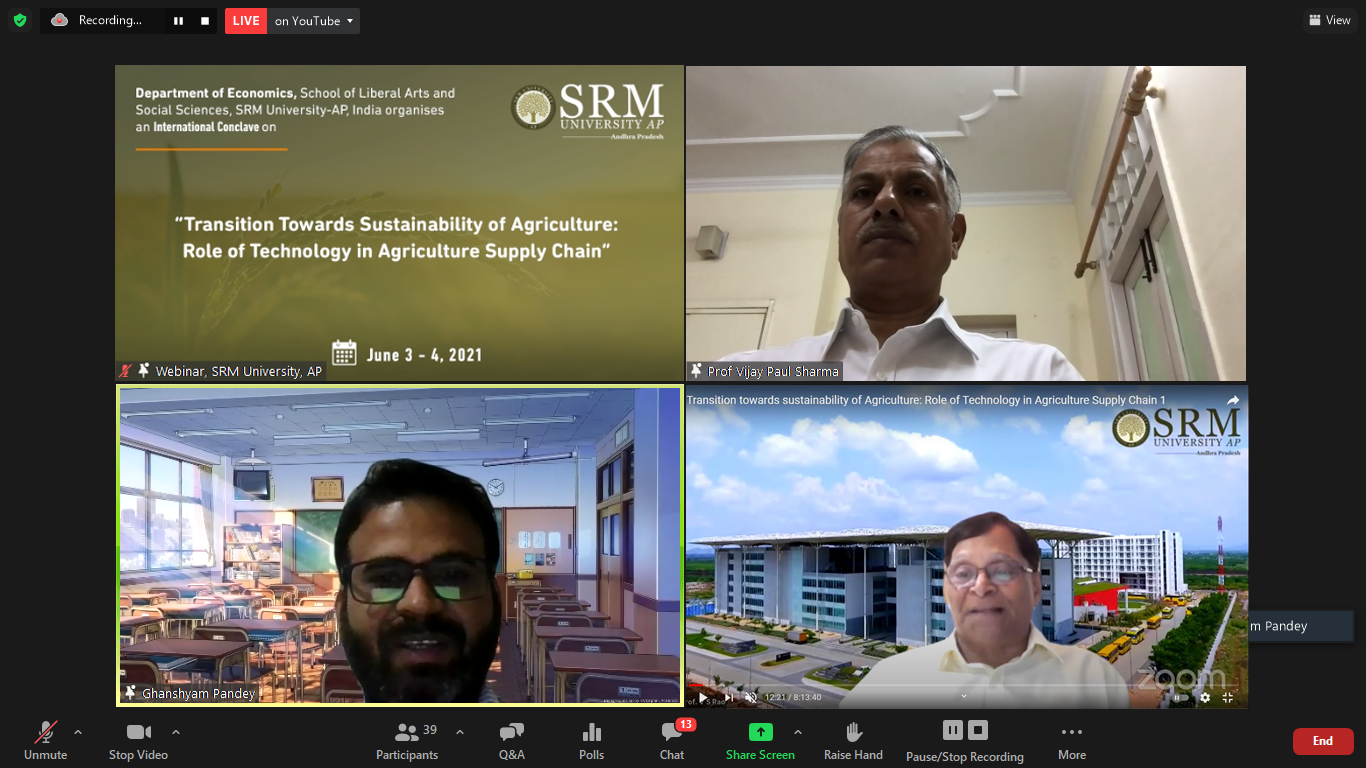 Department of Economics, SRM University-AP organised the International Conclave on “Transition towards sustainability of Agriculture: Role of Technology in Agriculture Supply Chain” on June 3-4th, 2021. Prof Vijay Paul Sharma, Chairman, Commission for Agriculture Costs and Price (CACP), Ministry of Agriculture & Farmer Welfare, GoI, India, was the chief guest of the event. The tope agricultural economist from India and abroad from the reputed institutions, i.e., Arizona State University, USA; Bangabandhu Sheikh Mujibur Rahman Agricultural University, Bangladesh; ICAR-NIAP; IFPRI South Asia Office Delhi; JNU, IIMA, IIMB, IGIDR Mumbai, Delhi School of Economics; Institute of Economic Growth; Symbiosis School of Economics, Pune; Central University of Punjab; Central University of Jammu; Sharda University, Noida; Amity University, Noida; PAU, Ludhiana; AN Sinha Institute of Social Sciences, Patna; Centre for Development Studies; Thrivanthapuram delivered lectures and participated in Panel Discussions in the two-day event.
Department of Economics, SRM University-AP organised the International Conclave on “Transition towards sustainability of Agriculture: Role of Technology in Agriculture Supply Chain” on June 3-4th, 2021. Prof Vijay Paul Sharma, Chairman, Commission for Agriculture Costs and Price (CACP), Ministry of Agriculture & Farmer Welfare, GoI, India, was the chief guest of the event. The tope agricultural economist from India and abroad from the reputed institutions, i.e., Arizona State University, USA; Bangabandhu Sheikh Mujibur Rahman Agricultural University, Bangladesh; ICAR-NIAP; IFPRI South Asia Office Delhi; JNU, IIMA, IIMB, IGIDR Mumbai, Delhi School of Economics; Institute of Economic Growth; Symbiosis School of Economics, Pune; Central University of Punjab; Central University of Jammu; Sharda University, Noida; Amity University, Noida; PAU, Ludhiana; AN Sinha Institute of Social Sciences, Patna; Centre for Development Studies; Thrivanthapuram delivered lectures and participated in Panel Discussions in the two-day event.
The event started with the welcome address of Dr Ghanshyam Pandey, Assistant Professor and Head of the Department of Economics and the opening remarks were delivered by Prof V S Rao, Vice-Chancellor, SRM University-AP.
“The agriculture and food sector are facing multiple challenges. With the global population projected to grow from 7.6 billion in 2018 to over 9.6 billion in 2050, there will be a significant increase in the demand for food. At the same time, the availability of natural resources such as fresh water and productive arable land is becoming increasingly constrained. Production is not the only concern; although agricultural output is currently enough to feed the world, 821 million people still suffer from hunger. Processes such as the rapid rate of urbanisation also have important implications for food production patterns and consumption patterns. This will require an urgent transformation of the current agri-food system. Digital innovations and technologies may be part of the solution. In the agriculture and food sector, the spread of mobile technologies, remote-sensing services, and distributed computing are already improving smallholders’ access to information, inputs, market, finance, and training. Digital technologies are creating new opportunities to integrate smallholders into a digitally-driven agri-food system,” said Prof Rao.
In the first Keynote speech of the conclave Prof Vijay Paul Sharma, Chairman, Commission for Agriculture Costs and Price (CACP), Ministry of Agriculture & Farmer Welfare, GoI, India, explained all the aspects of the agriculture sector to achieve sustainable growth. He started with agriculture production shifted from supply-driven to demand-driven, filling the yield gap between the states and moved on to the right kind of government intervention to improve the farmers’ welfare, shortage of labourer and mechanisation, technology, credit infrastructure, public investment, and climate change and variability.
Prof R S Desh Pande, a renowned economist, pointed out that we are at a stagnant point in agriculture, and the sustainability of agriculture would be very challenging. He mentioned that commercialisation (cropping method) and greed are the two major enemies of sustainability. He mentioned that largely we are getting the technology which is cost increasing techniques rather than cost-saving which ultimately leads to the decline of the net income of the farmers from the last two decades.
Advancing into the event, Prof P S Birthal, National Professor, ICAR-NIAP, PUSA Delhi, India, illuminated the audience with his strategic discussion on Agricultural Technologies and Supply Chains for Sustainable Agricultural Development. He discussed that in all revolutions in agriculture and allied activities in India, a common element had been the technology, although it was driven by different agents. He mentioned that technology is a key source for agricultural growth. Investment in research and development has increased but much less than the several developing and developed countries globally. He also mentioned that growth in agricultural markets had not kept pace with growth in agricultural production. Markets are inefficient because of poor infrastructure and communication networks that result in the higher cost of trade to sellers and buyers, along with asymmetric information between them. He has given some suggestions for farmers to benefit from, i.e., doorstep offtake of the produce, access to improve technology, quality inputs, access to credit insurance against market price, and diversification from water-guzzling crops like rice.
Prof Prem Vashistha from Sharda University highlighted the research innovation done by IFCO for liquid urea. A bottle of 5 ml urea is equally effective to one bag of urea, which is economical and reduces the burden of subsidy from the government. He mentioned this kind of revolution we required in all the areas for sustainable agriculture reducing subsidies. He also gave stress on linkages between institutions with the market are very important.
While talking on the role of technologies for sustainable agriculture, Dr Anjani Kumar, a senior fellow from International Food Policy Research Institute, South Asian Office, Delhi, mentioned how research is essential. Dr Kumar indicated that marginal returns to agricultural R&D expenditure are low for high-income states while more for low-income states. His research shows that R&D significantly impacts reducing poverty and inequality. He also mentioned that the seed replacement rate is frequently high in developed states while very low in underdeveloped states.
Almost 20 distinguished panellists and 20 presenters, along with more than 100 participants, attended the event. Dr Ananda Rao Suvvari, Assistant Professor, Department of Economics, SRM University-AP, cordially thanked all the speakers and panellists for their efforts to make the conclave a grand success.
Pre-Event Release: https://srmap.edu.in/events/economics-international-conclave-role-technology-sustainable-agricultural-growth/
- Published in Economics Current Happenings, Economics News, News
Prof C Durga Rao answers concerns regarding coronavirus third wave
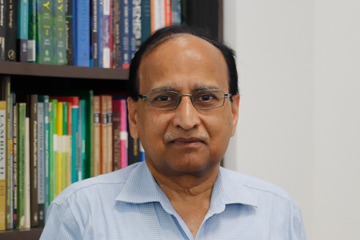 Eenadu newspaper has published an informative interview with Prof C Durga Rao, Professor of Biological Sciences & Associate Dean, School of Engineering and Sciences, and School of Liberal Arts and Social Science (SLASS), in their front page on the most relevant topic of our times, ‘Corona Virus and its Mutations’. As the world stays petrified awaiting further mutations of Covid-19 virus, Dr Rao clearly answered the pertinent questions regarding the waves of pandemic in this exclusive interview.
Eenadu newspaper has published an informative interview with Prof C Durga Rao, Professor of Biological Sciences & Associate Dean, School of Engineering and Sciences, and School of Liberal Arts and Social Science (SLASS), in their front page on the most relevant topic of our times, ‘Corona Virus and its Mutations’. As the world stays petrified awaiting further mutations of Covid-19 virus, Dr Rao clearly answered the pertinent questions regarding the waves of pandemic in this exclusive interview.
Detailing from the process of cell division to the natural process of origin of mutations, he talked about the harmless viruses and the pathogenic viruses that influence the immune system of the human body. Moving on to the antiviral medication, he cautioned against Remdesivir, a drug widely used for Covid-19 treatment. Majority of antiviral drugs are similar to the nucleotides in viral RNA, and are called analogues. As the virus keeps an mutating naturally because of the error-prone viral RNA polymerase that synthesizes progeny viral RNA copies, when a drug is frequently given to a patient, mutants that are resistant to the drug will be selected to replicate in the presence of the drug. Thus, when the same drug is given to treat the new mutant that escapes, the drug will not work against the new variants.
The single mutations L452R and E484Q, first detected in variants in the US and South Africa, respectively, occurred simultaneously in the double mutant, first detected in India. There is nothing surprising in finding double mutants as a variety of mutants are produced in a single patient, but only a few, which are capable of faster replication and spread will be able to survive in the population. As we have a large population density, the double mutant, which binds to the ACE2 receptor on the cell surface and enters into the cell more efficiently, spread like wildfire from December last year to March this year. To face the potential threat of the third wave of Covid-19 virus that is looming around us, the people have to take necessary precautions and comply with the lockdowns and restrictions. Though a third wave is inevitable, it is possible for India to avoid the severe impact of the third wave through wearing a mask, and immunization, he said. Approval of more vaccines and enhancing the delivery of vaccines across the country can shield the population from severe coronavirus disease and death.
Dr Rao, whose major research areas include Molecular Virology, Recombinant DNA technology, Vaccines and Diagnostics had been a professor and INSA Senior Scientist at Indian Institute of Science (IISc). He is currently working on a project worth 1.10 crore.
- Published in Biology News, News
Formulation of new designs and processing parameters for continuous hydrogen production
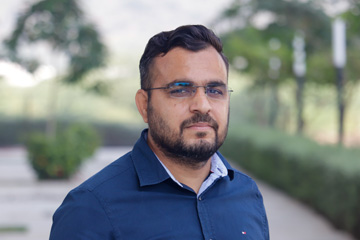 Dr Lakhveer Singh, Assistant Professor in the Department of Environmental Science, SRM University-AP, sets forth advanced avenues of scientific research on maintaining high current densities which is a key challenge in scaling-up microbial electrolysis cell (MEC) reactors.
Dr Lakhveer Singh, Assistant Professor in the Department of Environmental Science, SRM University-AP, sets forth advanced avenues of scientific research on maintaining high current densities which is a key challenge in scaling-up microbial electrolysis cell (MEC) reactors.
“Scaling-up Up-flow Microbial Electrolysis Cells with a Compact Electrode Configuration for Continuous Hydrogen Production”, published in the Bioresource Technology journal is about a novel 10 L microbial electrolysis cell (MEC) reactor with a total electrode surface area greater than 1 m2 was designed and evaluated for hydrogen production. Performances of the reactor suggest that the longitudinal structure with the parallel vertical orientation of the electrodes encouraged high fluid mixing and the sheet metal electrode frames provided distributed electrical connection. A high volumetric H2 production rate of 5.9 L/L/d was achieved at a volumetric current density of 970 A/m3 (34 A/m2). The Impact factor of the journal is 7.53.
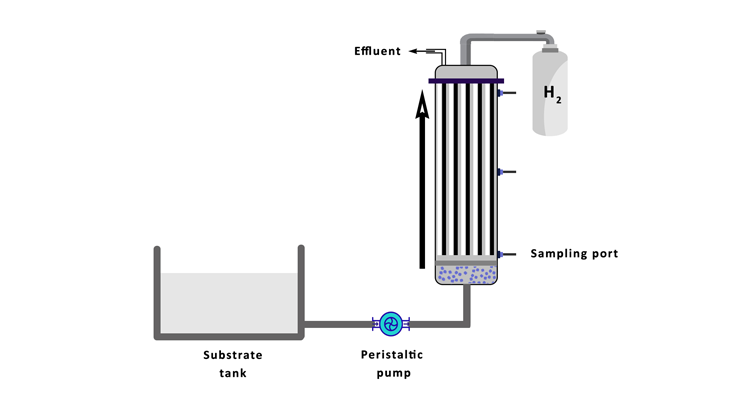 Dr Singh encapsulates that the technology and the model to be developed can be used to formulate new designs and processing parameters for producing H2 from other types of feedstocks and/or using engineered microbes developed by other researchers, which could solve the fuel problem for modern society. This work has been done in collaboration with Prof. Hong Liu from Oregon State University (OSU), USA.
Dr Singh encapsulates that the technology and the model to be developed can be used to formulate new designs and processing parameters for producing H2 from other types of feedstocks and/or using engineered microbes developed by other researchers, which could solve the fuel problem for modern society. This work has been done in collaboration with Prof. Hong Liu from Oregon State University (OSU), USA.
Dr Singh is an Editorial Board member of the Journal of Biomass Conversion and Biorefinery – Springer (I.F. 2.60) and a Guest Editor for Bioresource Technology Reports- Elsevier. His future research targets to reduce the component costs and test the proposed design using real waste streams, as well as continue to increase the reactor volume.
Read the full paper here: https://doi.org/10.1016/j.biortech.2021.125030
- Published in ENVS News, News, Research News
Search for compact IEC systems traversing disciplines
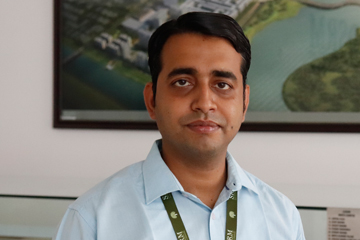 “Compact Inertial Electrostatic Confinement D-D Fusion Neutron Generator” is an imbuing research paper co-authored and published by Dr Somesh Vinayak Tewari, Assistant Professor in the Department of Electrical and Electronics Engineering (EEE), SRM University – AP, in the scientific journal, Annals of Nuclear Energy.
“Compact Inertial Electrostatic Confinement D-D Fusion Neutron Generator” is an imbuing research paper co-authored and published by Dr Somesh Vinayak Tewari, Assistant Professor in the Department of Electrical and Electronics Engineering (EEE), SRM University – AP, in the scientific journal, Annals of Nuclear Energy.
This paper is part of an interdisciplinary work leveraging the areas of both electrical engineering and physics. Inertial Electrostatic Confinement (IEC) Systems are simple, compact and operate on high voltage discharge in Deuterium- Deuterium (D-D)/ Deuterium-Tritium (D-T) gases between concentric grids for neutron generation. Such systems find considerable applications in the detection of explosives and illicit materials, radiography, tomography, and neutron well logging. The IEC system cathode temperature is measured with a Fibre Bragg Grating (FBG) during the measurement of neutrons from the system. FBG is optical fibre sensors that can be used for sensing temperature by recording the Bragg wavelength shift. The advantage of such measurements is that they can be used in environments such as electric arcs and plasmas, chemical and nuclear zones unaffected by electromagnetic fields such that the signals can be monitored remotely.
The production of neutron fluxes for the above-mentioned applications is through radioisotopes, accelerators, or nuclear reactors with the inherent nature of their complexity, hazards, and problem of residual radioactivity. Additionally, such systems require a considerable amount of shielding and Dr Tewari puts forth such factors that prompt further research in the area of the development of much simpler compact IEC systems.
The said research project has been carried out under the scheme of “Mentoring of Engineering Teacher by an INAE Fellow”, financially supported by the Indian National Academy of Engineering. The work goes forward in close collaboration with Pulsed Power & Electromagnetic Division, Beam Technology Development Group, Bhabha Atomic Research Centre (BARC)-Vishakhapatnam.
The future projects of Dr Tewari involve working on simulations related to the compact IEC for study, analysis, optimization of different parameters of an IEC system and related experimentation in collaboration with BARC.
- Published in EEE NEWS, News, Research News
Final year B.Sc. Biology student secures admission in University of Paris-Saclay, France
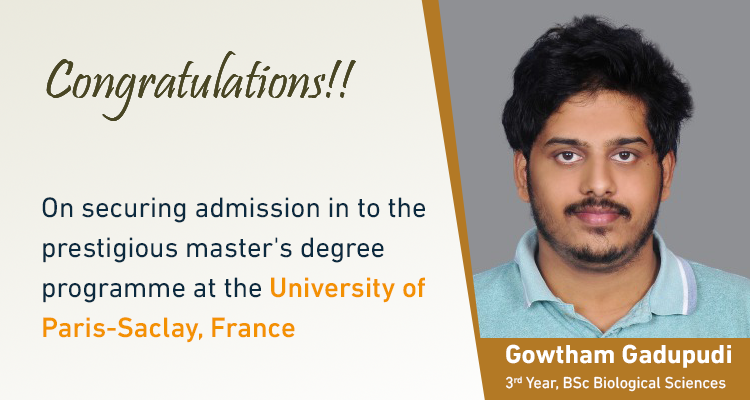 Student Interview: Gadupudi Gowtham
Student Interview: Gadupudi Gowtham
Q: Hi Gowtham, could you elaborate on the master’s program that you are being enrolled in?
A: Sure. M1 Life Sciences and Health – International Track – France, is a Master’s Program in the University of Paris-Saclay, France. I am enrolled in this research-driven multidisciplinary Master’s Program of two semesters that will nurture my research interests and can help me develop individual research trajectories.
Q: Please explain how this course is multidisciplinary.
A: This Master’s program is divided into three parts. During the first part of the program, all students are required to study Core Courses that address key concepts and challenges in the following basic fields of Life Sciences and Health. In the second part of the program, students can choose among a wide range of Elective Courses according their academic and career development goals. The third part is Research training which includes 4-week laboratory rotation period + 8-week internship.
Q: Had you applied to any other University?
A: Along with this university, I have also applied for Master of Science, Molecular Biology and Evolution (MAMBE) at the Christian – Albrecht University of Kiel, Kiel, Germany, and some other universities. MAMBE is an international program, taught entirely in English, and it is based on the fruitful collaboration with the Max-Planck Institute for Evolutionary Biology in Plön. Together with further collaborations (with the Leibniz Science Campus EvoLUNG (Evolutionary Medicine of the Lung), and also the Collaborative Research Centre 1182, Origin and Function of Metaorganisms), it specifically combines the areas of evolution and molecular biology – a combination which has emerged as an extremely successful interdisciplinary research field in recent years but has not yet been available in academic education.
Q: Can you talk about the Universities where you have applied in some detail?
A: In France, the University of Paris Saclay is a collaboration from all the respected universities with more than 300 laboratories with funding from the French government. And Kiel has emerged as a hotspot for Evolutionary Research in Germany. This includes several research groups with a focus on evolutionary topics at Kiel University (CAU).
Q: What are the scholarships that you have applied for?
A: Currently, at Paris- Saclay I haven’t applied for any scholarship yet but it has an Idex Scholarship for those who enroll in the Master’s Program.
In the MAMBE program, I have applied for the DAAD short-term scholarships and Promo’s scholarship for doing my Master’s thesis. Also, MAMBE has HiWi jobs as a research assistant at the desired lab. As a student affiliated to the Royal Society of Biology, I can also utilize the grants for my travel and Research Projects every year.
Q: How was your preparation for applications?
A: When I applied to the University of Paris Saclay, I applied through their University Portal. After verifications, I received an invitation for the Interview. On the day of the interview, I was asked about my current research project at SRM-AP, my motivation to study, and my future research goals and after 5 days I received an email stating that I was accepted.
I searched about German Universities through DAAD which is a database for education in Germany. After selecting the university, I had applied both online and through the post. Currently, it is being processed by the Uni- Assist where after meeting the requirements my application will be forwarded to the MAMBE admission team.
Q: Did you receive any support from SRM-AP and your department?
A: I can’t forget the support that I have received from SRM-AP University in providing me with the required attested documents and also giving necessary permissions during the pandemic. From the Department of Biological Sciences, the recommendation letters from Dr Jayaseelan Murugaiyan and Dr Manjunatha Thondamal supported my application to the universities that I have applied. The support and appreciation from everyone in the Biological Sciences Department has played an essential role in securing this admission.
- Published in Biology News, News, Students Achievements

